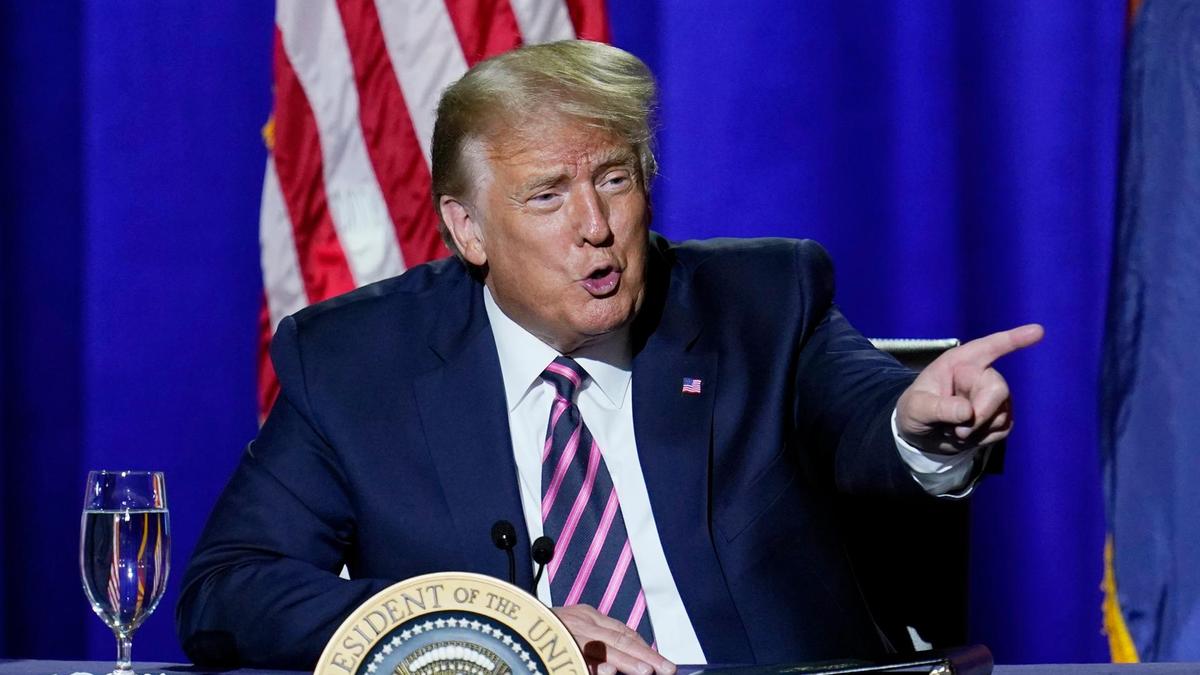Trump warns Iran of “1,000 times greater” response to any assassination plot or attack on US

A few minutes every morning is all you need.
Stay up to date on the world's Headlines and Human Stories. It's fun, it's factual, it's fluff-free.
American intelligence officials have been reportedly aware of threats against the US envoy in South Africa
United States President Donald Trump on Monday, September 14, warned Iran of severe consequences if it tried to carry out an assassination attempt or attack against the US.
Trump’s stern message to Iran came after a media report on Sunday claimed that Iran was planning to avenge the killing of general Qasem Suleimani, commander of the Islamic Revolutionary Guard Corps’ Quds Force, who was killed in a US drone strike in Iraq earlier this year.
The report alleged that the Iranian government was hatching a plot to assassinate the US Ambassador to South Africa Lana Marks, and the Iranian Embassy in Pretoria was involved in it.
“According to press reports, Iran may be planning an assassination, or other attack, against the United States in retaliation for the killing of terrorist leader Soleimani, which was carried out for his planning a future attack, murdering U.S. troops, and the death & suffering caused over so many years. Any attack by Iran, in any form, against the United States will be met with an attack on Iran that will be 1,000 times greater in magnitude,” Trump tweeted on September 14.
“We’re all set. They’ll be hit a thousand times harder,” Trump repeated, during an interview on Tuesday morning with the news show “Fox & Friends.”
The Pentagon said Soleimani “had been actively developing plans to attack American diplomats and service members in Iraq and throughout the region.”
“We make very clear to the Islamic Republic of Iran that this kind of activity – attacking any American any place at any time, whether it’s an American diplomat, an ambassador or one of our service members – is completely unacceptable," Secretary of State Mike Pompeo told Fox News on Monday.
“Iran has engaged in assassination efforts all across the world. They have assassinated people in Europe and in other parts of the world. We take these allegations seriously,” he added.
American intelligence agencies have been reportedly aware of the potential danger to Ambassador Marks’ life in recent months but the threats have become more specific lately.
According to sources within the intel community, the South African Ambassador could be just one among several US officials who are on Tehran’s hitlist in retaliation for the killing of Soleimani.
Marks, who has known Trump much before he became the US president, is not believed to have any known links to Iran. Her association with Trump and Iran reportedly running covert networks in South Africa could be the reason behind Tehran’s alleged assassination plot against her.
Iran’s response to the report and Trump’s warning
Iran responded to Trump’s tweet the next day by warning him against making a “strategic mistake.”
“We hope that they do not make a new strategic mistake and certainly in the case of any strategic mistake, they will witness Iran’s decisive response," Iranian government spokesman Ali Rabiei told a news conference.
The Iranian foreign ministry called the allegation of an assassination plot “baseless" and part of “repetitive and rotten methods to create an anti-Iranian atmosphere on the international stage."
US-Iran antagonism
The US-Iran relationship has been antagonistic since Iran’s Islamic revolution in 1979. Washington put Iran under several sanctions, accusing the Iranian government of developing nuclear weapons and funding international terrorism.
The relations between the two countries deteriorated further over time and have particularly spiraled downward in recent years.
In May 2018, Trump unilaterally pulled the US out of an international nuclear deal with Iran, calling it “decaying and rotten” and reimposed the lifted sanctions on Iran. The deal was reached in July 2015 under the Obama administration and involved the five permanent members of the United Nations Security Council (UNSC), Germany and the European Union (EU). When the UNSC endorsed the deal in 2015, certain sanctions on Iran’s nuclear program were lifted but some restrictions on ballistic missile activities were retained.
In August this year, the UNSC rejected a US resolution aimed at indefinitely extending an arms embargo on Iran. The 13-year embargo on Iran is due to expire on October 18 but the US has been relentlessly pushing the diplomatic offensive to ensure further sanctions. Secretary Pompeo on Tuesday asserted that the US would not let Iran do weapons-related transactions with countries or extremist groups.
“We are going to act in a way – and we have acted in a way – that will prevent Iran from being able to purchase Chinese tanks and Russian air defense systems and resell weapons to Hezbollah," Pompeo said.
Hezbollah, which is an Iran-backed movement and blacklisted as a terrorist organization, has been targeted by US sanctions for many years.
In June 2019, Iran shot down a US RQ-4 drone after it allegedly violated Iranian airspace, a claim the US rejected. Last week, the Iranian navy reportedly drove off three American aircraft, claiming that they violated the Iranian air defense zone by flying close to the Strait of Hormuz where military exercises were underway.
Have a tip or story? Get in touch with our reporters at tips@themilsource.com




Comments ()